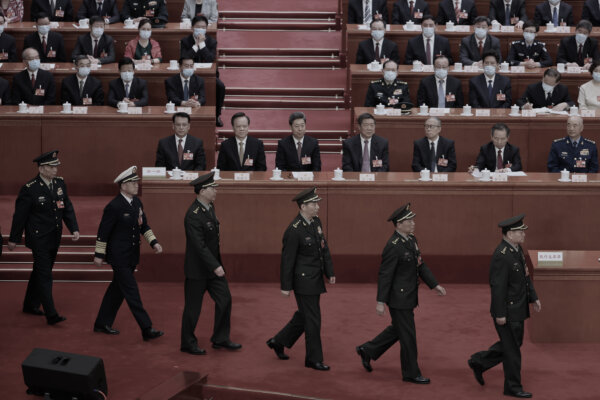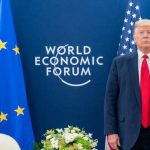The ministry said that the nine, including one of the country’s two vice chairmen of the Central Military Commission (CMC), were expelled for “disciplinary violations and allegedly serious duty-related crimes.”
Zhang Xiaogang, the ministry’s spokesman, said in a statement that an investigation uncovered crimes involving “huge amounts” of illicit gains with an “extremely serious nature and egregious impact.” Their cases have been transferred to military prosecutors following their expulsion from the CCP.
According to the statement, those expelled include He Weidong, the CMC’s vice chairman and one of Chinese leader Xi Jinping’s most trusted allies, as well as Miao Hua, former head of the CMC’s Political Work Department; He Hongjun, the department’s former deputy head; Wang Xiubin, former deputy chief of the CMC Joint Operations Command Center; Lin Xiangyang, former commander of the PLA Eastern Theater Command; Qin Shutong, former political commissar of the PLA Ground Force; Yuan Huazhi, former political commissar of the PLA Navy; Wang Houbin, former commander of the Rocket Force; and Wang Chunning, former commander of the People’s Armed Police Force.
Officers Linked to Xi’s Fujian Power Base
Several of the dismissed generals share a common link to Xi’s past years in Fujian Province, where he served from 1985 to 2002 in the CCP’s hierarchy. During that time, Xi developed close ties with the PLA’s 31st Army Group, a key military unit stationed in the region that has since become known as Xi’s “home-base army.”
He Weidong, who served as chief of staff of the 31st Army Group in 2007 and later rose to command the Eastern Theater Command, is widely viewed as one of Xi’s protégés. His appointment as CMC vice chairman in 2022 broke precedent as he was elevated to the position despite never having previously served as a full Central Committee member, a sign of Xi’s personal trust.
He Hongjun, Miao’s deputy and fellow native of Shaanxi, the same province as Xi, was promoted to full general in July 2024 with Xi personally presiding over the ceremony. His sudden fall, coming just months later, indicates that an investigation may have begun earlier.
Wang Xiubin and Lin Xiangyang, both of whom previously served in the 31st Army Group, were promoted to general under Xi’s direct approval. Lin later commanded the Eastern Theater Command, which oversees potential future military operations concerning Taiwan, a politically sensitive post that signals high confidence from the top.
U.S.-based former PLA Navy Lt. Col. Yao Cheng said on X that when Qin Shutong, who was purged, served as deputy director of the political department of the PLA’s 12th Army Group, Miao was then the army’s political commissar, meaning the two had once worked together.
Such links show that the expelled officers were deeply connected to Xi’s inner power circle.
The rest of the purged involved Yuan Huazhi, who rose through the Navy’s political ranks under Miao’s mentorship; Wang Houbin, a naval commander elevated to lead the Rocket Force in 2023; and Wang Chunning, head of the paramilitary People’s Armed Police, a “Red Second Generation” whose father was a senior military officer in the former Nanjing Military Region.
Implications for Xi’s Control
The CMC statement described the purge and expulsion as proof of the Party’s “firm resolve” to fight corruption. However, such a move against officers personally promoted by Xi suggests possible strains in the regime leader’s long-cultivated control over the military.
In addition, the depth and frequency of recent purges have raised questions about the stability and morale of the CCP’s armed forces at a time when Beijing is escalating its military pressure on Taiwan and facing increasing geopolitical tensions with the United States and its allies.











